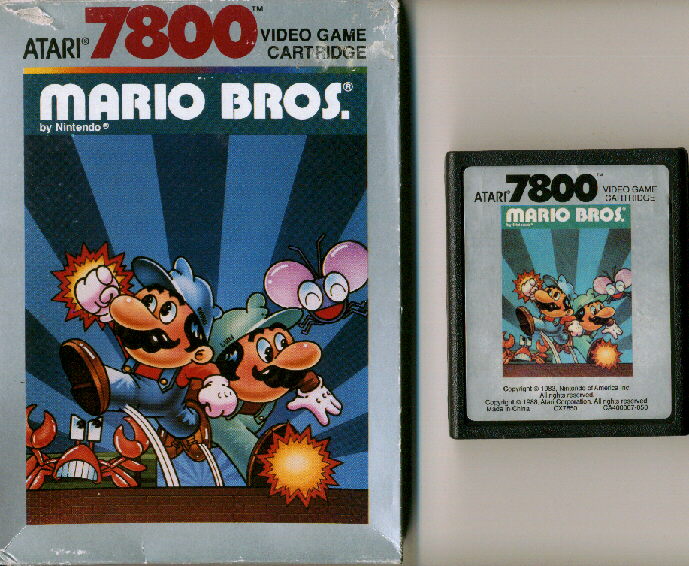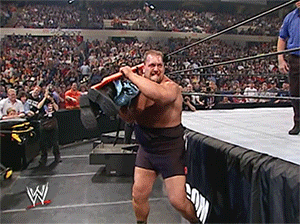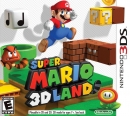Maelstrom picks apart the author from GAF:
First off, the guy gets the generations incorrect. There are only two generations of game consoles prior to the Atari crash, not three. There were the consoles without cartridges (PONG machines) and the consoles with consoles (beginning with the Atari 2600). 1977 (when the Atari 2600) to 1983 (the crash) is six years which is the average length of a generation. In trying to split it into two, the guy has Generation 2 be three years and Generation 3 be three years. COME ON. Three year generations?
Now let’s roast this turkey.
Nintendo, who had been suffering financially since the gaming market crash during the Third Generation…
The author makes up things out of his own ass. Nintendo was certainly not suffering financially. Nintendo was making best selling games in the arcades (Donkey Kong Jr. and Mario Brothers) as well as TAKING OVER JAPAN with the Famicom in 1983+.
Where else does the author think Nintendo got the money in order to release their console in the United States? Nintendo had extremely strong financials which is what attracted investors during their American push.
Hiroshi Yamauchi, Nintendo’s president, instructed his engineers to leave out the frills of the other gaming systems, and include only the essentials to save money.
I can’t tell if the author is referring to the Famicom or the NES. The NES was originally shown at Consumer Electronics show with a keyboard and all sorts of frills. The original NES release included R.O.B. the robot, light gun, multiple controllers, and a couple of games (Duck Hunt and Stack Up I believe). Essentials my ass.
He is likely referring to the Famicom that did had an initial defect rate. He doesn’t mention that Nintendo ate the cost to repair the problem. I’m not sure what he is talking about when it comes to the Famicom hurting its relations with retailers and developers. Famicom unpopular in Japan? The author is crossing into science fiction and fantasy.
After the Nintendo Entertainment System (NES) was released, Nintendo pressed for huge media infiltration of their advertisements, which was something not being done by competing systems. The market had been extremely slow in the previous years, and many companies were very cautious.
Nintendo was very cautious with the NES release. It released the NES in ‘test markets’. The first ‘test market’ was New York City.
I have no idea what he is referring to with ‘marketing media blitz’. Does he mean the Fun Club Newsletter? I would not call that a ‘marketing media blitz’. A few commercials on TV that had R.O.B. the Robot? What exactly is the author saying? We don’t know. He just goes on.
Nintendo, fueled by a marketing drive rarely seen, was able to capture nearly 90% of the U.S. gaming market by 1986.
I’m not sure if the year is correct. Nintendo did get 90% marketshare which had to have occurred before the release of the Sega Genesis (1989).
What was the gaming market in that time? I know they aren’t including arcades or PCs here. The numbers would reflect whoever was growing the market the fastest, and it sure wasn’t the Sega Master System.
The NES penetration rate would exceed that of Atari 2600s and has yet to be surpassed in popularity (in terms of household penetration) by any console that came after it. It is why in 2006, Nintendo execs kept citing the Wii to resume NES’s mission to ‘grow the market’. Gaming was not becoming more popular, society-wise, since then.
This popularity had dozens of gaming companies at Nintendo’s door to produce titles for their system.
This is true. Everyone wanted a piece of the pie.
However, because of Yamauchi’s foresight, Nintendo had changed the previous “free-market” set up of the industry with the inclusion of something called a “key-chip” in his NES units.
Yamauchi had nothing to do with this. The Famicom didn’t even have this chip, I believe. The lock out chip of the NES was put in place to avoid the fate of the Atari crash. You had to have Nintendo’s permission to sell your game for their system. There is nothing unusual to this, and Nintendo’s NES practices established the legal framework that consoles today use.
‘Free market’ set up? This was the free market at work. Atari OWNED the game console market, but they screwed it up. American game companies abandoned the console market which is why a Japanese game company took over.
During the preceding generations, a video game programmer would simply purchase the equipment to construct games for a system from the system’s parent company. The programmer was then was free to design any game without permission from the company. (A prime example of this was the video game based on the “Porky’s” movies released by CBS for the Atari VCS/2600.)
THIS IS WHAT CAUSED THE ATARI CRASH!!!! Does the author not even know what he is saying!??? Anyone and everyone began making games for the Atari 2600, even General Oats and Colgate. There was so much crap out there that it all crashed.
Yamauchi did not like this freedom given to the designers.
The statements the author makes. He makes it sound as if Yamauchi is some emperor or something.
The disabling code was then patented by Nintendo and copyrighted. The result was that it became illegal to reproduce the code, without Nintendo’s consent. Nintendo then made specific contracts that companies must agree to abide by in order to receive permission to reproduce the “key-chip.” This gave Nintendo complete control over its third party licensees, and they used that control to propel the Nintendo Entertainment System farther.
Atari stole the code from the copyright office and began making cartridges of their own without Nintendo’s permission. It caused Atari to get sued in a very large court case.
I’m not sure what ‘control’ the author is referring to. The only ‘control’ Nintendo had was to make sure games were not published without their consent on the system. For example, a third party couldn’t make more than five games per year on the system. The reason why is because Nintendo didn’t want a flood of crap. Less games meant companies would try to make the games good so they would sell better (instead of flooding with software).
The Nintendo platform was not the console market. It was Nintendo’s market. They took the risk and established it. And there was MASSIVE risk back then and even today of making game consoles.
Because of Nintendo’s considerable market share, few companies argued with this policy.
It was the law, not Yamuahi’s ‘will’.
The result was that many competing systems were driven to extinction because of a severe lack of games. Companies like Atari and Sega could not hope to compete with a system with over 100 new games each year, when they could only produce a dozen or so annually without the help of third party licensees. This propelled Nintendo’s domination of the market further.
Then why did so many games on the NES appeared on the Atari and Sega systems? Even Nintendo’s own games appeared on Atari’s system.

Above: Even Atari had Mario and Luigi. Of course, this was not SUPER Mario Brothers which was a phenomenon back then.
Nintendo began orchestrating game shortages sometime in 1988. This was called “inventory management” by Peter Main, an executive in charge of public relations at Nintendo, but was really to keep the customers on a short leash. By limiting the amount of product available, Nintendo could keep the demand for the product high. The editor of one toy-industry journal noted that “Nintendo has become a name like Disney or McDonald’s. They’ve done it by doling out games like Godiva chocolates.” By design, Nintendo would not fill all of the retailers’ orders and kept half or more of its library of games inactive and unavailable. In 1988, for instance, 33 million NES cartridges were sold, but market surveys indicated that upwards of 45 million could have been sold. That year retailers requested 110 million cartridges, almost 2.5 times the indicated demand. These practices would greatly benefit Nintendo, but drive many smaller software firms out of business. Certain titles would be produced, then sold very slowly over the span of a year, and the profits would not come in fast enough to keep these small companies afloat. The toy and electronics as well as department stores became dependent on Nintendo, in addition to most game producers. This gave Nintendo a great deal of clout in dealing with companies who were used to throwing their muscle around.
1988 was when the NES really took off. It was 1988 when there was a great cartridge shortage. There was no ‘manufactured shortage’. It was like the Wii. Nintendo just didn’t have enough cartridges due to overwhelming demand.
Another Nintendo policy that made retailers furious was their return policy, or lack thereof. Because Nintendo’s quality control was boasting a defect rate of 0.9% for hardware and 0.25% for software by 1988, Nintendo executives did not see a need for their previous 90 day guarantee. A new policy was announced to the retailers: no returns. Once a game cartridge box or system box was opened, a refund was out of the question. Concerning this, Sheff wrote:
“Pandemonium followed. One of the largest retailers in the country threatened to stop carrying Nintendo Systems and products. Nintendo refused to change the policy and the retailer refused the products. The retailer held out for three months; after that it crawled back and agreed to Nintendo’s terms.”
The melodramatic Sheff quotes aside, why would Nintendo take a loss on defects when the NES which was selling out everywhere? Nintendo had a hot product. So they placed the leverage on the retailers. The retailers could either choose the risk of the low defect rate to have the ‘hot product’, or they could do without. I don’t see the issue here.
Nintendo’s next atrocity would be to use the considerable monopoly they had to control the consumer. Because of the game shortages, consumers would be more concerned about getting a particular title than the price. And because of Nintendo’s domineering stance with the retailers, they were able to dictate the expected prices for their games.
No. Demand was greater than supply. When that happens, the supplier sets his own price. When the supply is higher than the demand, the demand sets its own price.
In the electronics and computer industry, you can expect equipment to reduce in price over time. When new devices are created that make older ones obsolete, the older devices are reduced in price to compete with the newer ones. This is clearly evident if one simply peruses the want-ads in their local paper and notes the prices of computer systems that were considered state of the art a year previous. This logic applies to all aspects of the computer and electronics industry, including video games. Why then between 1985 and 1989 did the Nintendo Entertainment System only lower $10 in its price?
It is because demand didn’t lower until 1989. And 1985 and early 1986 were nothing but test markets. The NES was similar to the Wii phenomenon.
This was exactly what Attorney Generals from all fifty states were wondering when they began investigating the activities of Nintendo of America in 1989. They found that Nintendo had been fixing the price of systems and games in the stores, using intimidation to influence retailers to abide by their wishes, and were making astronomical profits. Nintendo had been doing this since they first brought out the NES in 1985. They had strived to construct the system inexpensively, however, it was being sold at the same price as the competing systems. An antitrust action was brought up against Nintendo by these same Attorney Generals, and on October 17, 1991, District Court Judge Sweet granted approval of settlement agreements. [775 F.Supp. 676 (S.D.N.Y. 1991)]
Here is the letter I received.
Note that the author refrains from quoting reactions to this case. Let us hear what Sheff said in his book “Game Over”. This is a quote from page 273 from my book.
What it boiled down to was that Nintendo was forced to offer a merchandising deal that Peter Main might have cooked up on a good day. It was, pure and simple, a promotion to encourage people to buy millions of Nintendo games. It was also an indication that the government’s case against Nintendo was fragile.
But Sheff doesn’t stop there. He quotes an editorial in Barron’s (December 1991 issue). It says:
The settlement, the piece read, “was declared a victory. Abrans said it sent ‘the most powerful possible message across the country that we will not tolerate this kind of pernicious practice which takes millions of dollars out of the pockets of consumers.’ Indeed, it was a victory for Abrams, who arranged for Nintendo to mail out the coupon with self-congratulatory letter from him, just as his campaign for the U.S. Senate got under way. In contrast, consumers had to spend $20 to $70 on Nintendo products in order to enjoy the $5 rebate.
The government had lost the case. The letter and coupon was the government saving face by the politicians trying to show ‘the folks’ that it wasn’t all for naught. It was open season on anything Japanese in the 1980s.
I personally think that the inherent risks of a signle system market are sufficient to warrant concern if the industry becomes dominated by one company again.
What is this author smoking? The NES didn’t ‘dominate’ the market, and didn’t ‘take over the market’. There was no market there. The NES created the market. It was like the Wii with its Wii Sports and Wii Fit games. Nintendo didn’t take over fitness game market because there really wasn’t a fitness game market to begin with.
The only thing stupider than the author are people who cite NES history as to why modern day third party companies don’t want to publish their games on the Nintendo system. The reason why they don’t is because they don’t think they will make money. However, third parties publish games on the Nintendo handheld system all the time outside of the Sony handheld because *gasp*, they think they can make money that way.




































































